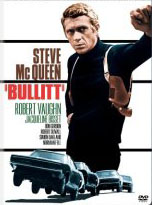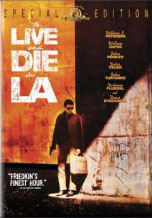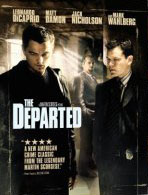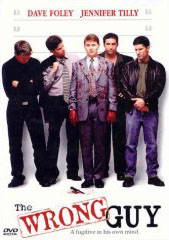
 Bulliitt is a classic that everyone talks about, but not everyone has seen. Though Steve McQueen is a well-known name, fewer and fewer young people have seen his films, having only been a presence in the film industry for less than two decades before his death of lung cancer. Better known as a cowboy actor and a TV star, McQueen branched out into film and found fame in movies like The Great Escape, The Sand Pebbles, Papillion, and this movie.
Bulliitt is a classic that everyone talks about, but not everyone has seen. Though Steve McQueen is a well-known name, fewer and fewer young people have seen his films, having only been a presence in the film industry for less than two decades before his death of lung cancer. Better known as a cowboy actor and a TV star, McQueen branched out into film and found fame in movies like The Great Escape, The Sand Pebbles, Papillion, and this movie.
One of the first real action movies, Bullitt sets up a template that was copied, watched, and revered by other moviemakers, the car chases attempted by films like Friedkin's The French Connection and To Live And Die In L.A. being pale imitations of the wild and riveting shots and structure of Bullitt's pivotal chase.
As Robert Vaughn pointed out, the plot doesn't make a whole lot of sense, but that's not really why people watch the movie. The tale of dead witnesses, hitmen, doubles, and chases is more of a framework for McQueen's love of driving, stunts, and the action of reality, never portrayed in movie form. McQueen produced this movie as an act of love for the stylizations it features, major shifts in movie-making that are common today but before unseen, making it absolutely revolutionary for its time.
McQueen is, as ever, understated and hands off as many lines as possible to the other actors, doing all his work with facial expressions and tight glares of his bright but weathered eyes. Claiming himself to be more of a "reactor" than "actor," McQueen plays the charismatic and driven everyman cop with nothing more than a series of gestures and movements of the eyes, delivering as much meaning as many actors manage with long diatribes of scenery-chewing bullshit.
A deeply-flawed and somewhat likable individual, McQueen brings through his real love and passion in the simple and almost resigned, unemotional portrayal of a police officer doing his job.
Though this movie would go on to inspire countless other flashy 80's action films, its action and pacing are something else entirely, feeling almost slow and methodical now as it plods toward its less-than-thrilling conclusion. But one would be hard-pressed to find something shot in similarly brilliant fashion before or a decade after, except perhaps The Manchurian Candidate, whose director, John Frankenheimer, seemed to draw inspiration from Bullitt for the high-paced driving action of one of his final films, Ronin.
If the movie is remembered for nothing more than its action shots and car chases, it wouldn't be an insult to the movie's quality, as Vaughn is right in saying that its movements are nothing stellar, but it's an intriguing film and shows some of the character that drove McQueen to his now-flagging stardom.



 The Departed is not exactly deserving of all the accolades heaped upon it. I feel the same way, in general, about the direction of Martin Scorsese, though even moreso than The Departed.
The Departed is not exactly deserving of all the accolades heaped upon it. I feel the same way, in general, about the direction of Martin Scorsese, though even moreso than The Departed.
 "Airplane!?" you'll wonder. "That old movie?"
"Airplane!?" you'll wonder. "That old movie?"